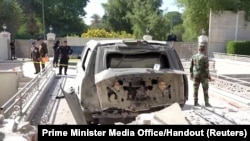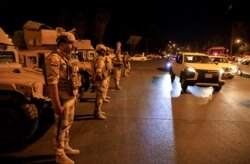Analysts say the latest drone attack on Iraqi Prime Minister Mustafa Kadhimi's home underscores the growing threat presented by commercially available, easy-to-obtain unmanned aircraft in Iraq.
Iraqi officials say three small "quadcopter" drones were used in the Saturday attack, which did not hurt Kadhimi but injured at least three of his security guards.
Officials say the drones were the same explosive-laden drones employed by Iran-backed Shi’ite militias against U.S. military bases in Erbil and elsewhere in Iraq.
"Armed drones are an increasing and emerging threat, especially those being used by pro-Iranian groups," said Seth Frantzman, author of a recently published book titled Drone Wars: Pioneers, Killing Machines, Artificial Intelligence, and the Battle for the Future.
Frantzman told VOA that, "Armed militias backed by Iran have an advantage that they can strike where they want when they want with this new technology and then melt away with the operator in hiding and the technology and plans often not being discovered," explaining that Iran has helped its proxy groups throughout the Middle East to obtain drones.
Intercepting low-flying drones that can be modified to carry explosives remains difficult for Iraqi forces. Drones were recently used to target Kadhimi's home in Baghdad's Green Zone, demonstrating how a highly guarded location protected by American-made anti-missile systems could be breached by drones.
"Drones can fly slow and low and avoid some air defenses. Many air defenses are also not designed to confront the plethora of emerging types and sizes of drones," said Frantzman.
He added, "Questions also arise about whether it's possible to use jammers and GPS-denial systems to stop these attacks in the future or whether the government will need to acquire systems that can shoot down drones."
The recent drone attack came just weeks after Iraq's parliamentary elections, in which the Fatah Alliance, the electoral list representing pro-Iran militias, suffered a substantial defeat, with its seats in the 329-seat parliament decreasing from 48 to about 16.
The Sadrist Movement, led by Shi’ite religious leader Muqtada Al-Sadr, who used to be an ardent adversary of the U.S. in Iraq, came out on top in the elections. The Sadrists gained 74 seats, an increase of 20 seats over the previous election in 2018.
According to Reuters, Al-Sadr described the bombing as a terrorist act designed to "return Iraq to a state of disarray controlled by non-state forces."
Former State Department advisor David Pollock, who now works as a senior analyst for the Washington Institute for Near East Policy, says he doubts Iran was behind the attack and that it was more likely a reflection of militias' concern of being "pushed to the sidelines by the election."
"There are reasonable grounds to make the case that this was something that Iran itself was not behind," he told VOA.
He added, "These were the militias acting or one of them on their own behest and that Iran would have possibly calculated that this was too provocative."
The attack drew condemnation from world leaders, including U.S. President Joe Biden, who demanded that the perpetrators be brought to justice.
"I strongly condemn the terrorist attack targeting the residence of Iraqi Prime Minister al-Kadhimi,” said Biden in a White House statement.
"I have instructed my national security team to offer all appropriate assistance to Iraq's security forces as they investigate this attack and identify those responsible," he added.
Hashd al-Shaabi, or Popular Mobilization Forces (PMFs), are a collection of Shi’ite militia groups that has protested the election, claiming it was rigged.
Human rights organizations have accused PMFs of violating human rights and committing war crimes in Syria, where they were instrumental in the fight against the Islamic State (IS).
Despite the brazen nature of the drone attack, there is little prospect that its mastermind would be apprehended, especially if powerful Shi’ite militia leaders turn out to be suspects.
"Even this attack I don't think is not going to produce a dramatic escalation of this confrontation," said analyst Pollock.
(This story originated in VOA’s Kurdish Service.)






